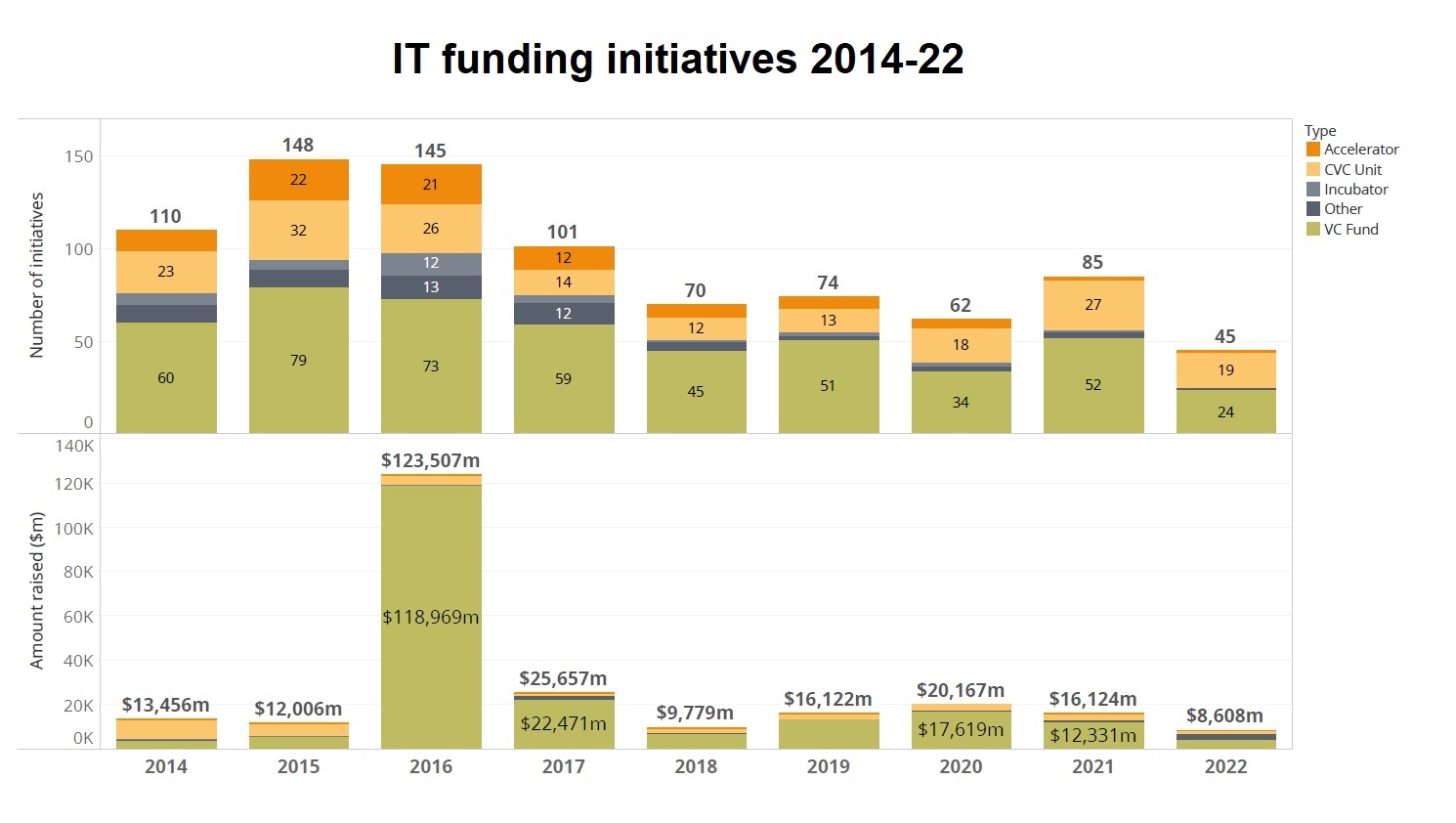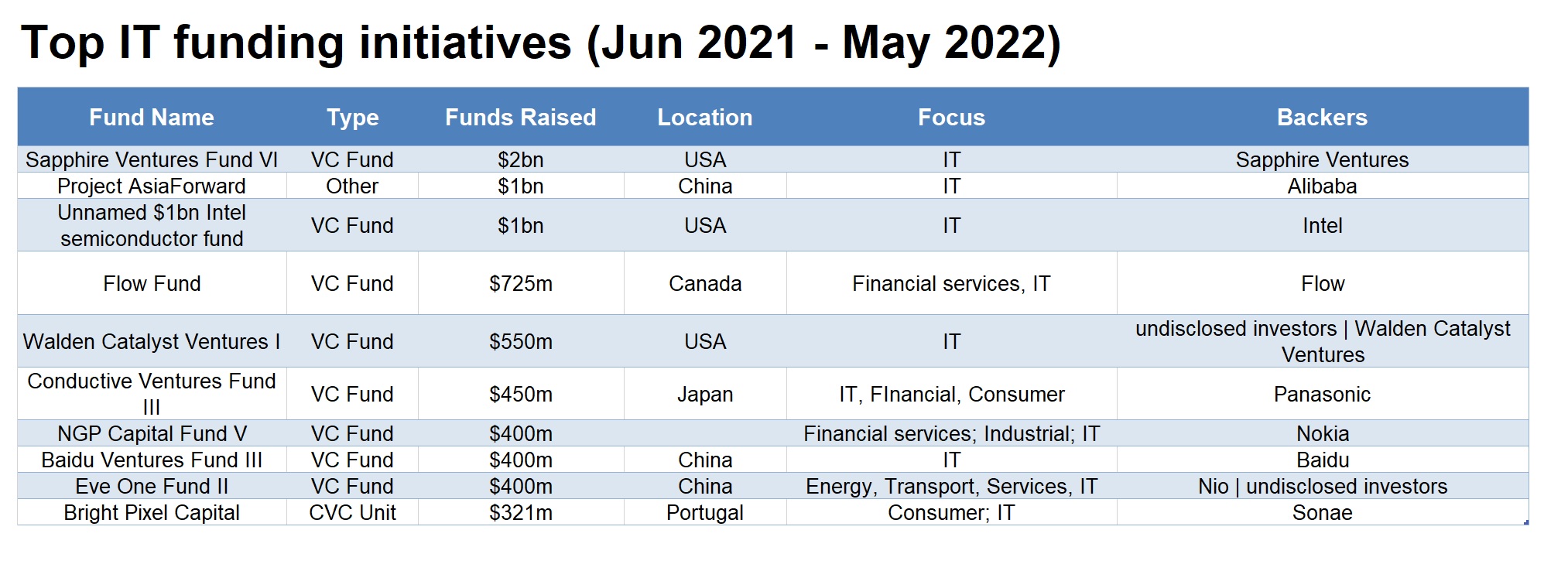
For the period between June 2021 and May 2022, corporate venturers and corporate-backed VC firms investing in the IT sector secured $22.41bn in capital via 105 funding initiatives, which included 63 VC funds, 37 newly-launched or refunded venturing units, two accelerators and three other initiatives.
On a calendar year-to-year basis, the number of funding initiatives in the IT sector went up by 37% from 62 in 2020 to 85 registered by the end of last year. Total estimated capital, however, went down from $20.17bn in 2020 to $16.12bn in 2021, a 20% decrease.

Read the rest of the IT sector report
- Tech companies slow investment activities
- Deals in the IT sector
- Exits for IT sector investors
- New corporate IT sector funds
- Deals for university spinouts in the IT sector
- People moves
Sapphire Ventures, a US-based independent venture capital firm backed by software provider SAP, raised almost $2bn and expanded its sports-focused investment team with the hire of Chloe Steinberg as a partner. In its largest fundraise to-date, the firm said the closings of Sapphire Ventures Fund VI and associated co-investment vehicles took its assets under management to $8.8bn. Sapphire invests in series B through late-stage enterprise technology companies in the US, Europe and Israel and would move beyond SAP as its limited partner (LP). The firm has opened three new offices in Austin, London and San Francisco, with Sapphire’s new London-based team led by Andreas Weiskam.
Alibaba Cloud, the cloud services subsidiary of e-commerce group Alibaba, pledged $1bn to an initiative to support tech startups and developers. Project AsiaForward is intended to support some 100,000 recipients over the next three years while also providing training for prospective software developers and linking entrepreneurs to venture capital investors. The move came as Alibaba’s cloud platform is reportedly losing ground to competitors such as Tencent and electronics producer Huawei as well as US rivals such as Amazon Web Services. Alibaba Cloud has made investments in the past.

Intel Capital, launched a $1bn investment vehicle with its semiconductor fabrication business, Intel Foundry Services (IFS), to foster an innovation ecosystem surrounding fab technology. The fund will back early-stage developers of foundry-related technologies with the potential to help reduce the time to market for IFS’s customers, covering areas such as intellectual property (IP), software, innovative semiconductor architectures and advanced packaging.
Canada-based blockchain technology platform Flow, a Web3 platform formed a $725m vehicle to support entrepreneurs working on Web3-driven apps, games and digital assets.
Walden Catalyst Ventures, the US-based venture capital firm co-founded by ex-employees of Samsung’s Catalyst Fund, closed its debut fund at over $550m. The limited partners were not disclosed but the firm said they included institutional investors as well as the chief executives of top tech companies. It is targeting companies with business models that rely on artificial intelligence and big data. Young Sohn, one of Walden Catalyst Ventures’ two founding managing partners, was formerly chief strategy officer of Samsung Electronics and ranked fourth on Global Corporate Ventures’ 2019 Powerlist.
Japan-headquartered consumer electronics manufacturer Panasonic provided $200m in capital for US-based venture capital partner Conductive Ventures’ third fund. Founded in 2017 by managing directors Carey Lai and Paul Yeh (pictured on main page), Conductive targets developers of hardware, software, technology-enabled services and blockchain products at growth stage, and has cited startups led by non-traditional founders as a key area of interest. The firm has achieved seven exits so far, including additive manufacturing technology provider Desktop Metal, which listed on the New York Stock Exchange in an August 2020 reverse takeover valuing it at $2.5bn post-transaction, and electric bus producer Proterra, which secured a $1.6bn enterprise valuation in its own reverse merger, in February 2021. Panasonic supplied the entirety of Fund III’s capitalisation, having done the same for its $100m inaugural fund in 2018 and its $150m sophomore vehicle two years later.
Smartphone manufacturer Nokia provided $400m in capital for the latest fund closed by NGP Capital, the US-based venture capital firm spun off by the corporate. NGP Capital was originally formed in 2005 as a direct subsidiary of Nokia named Nokia Growth Partners but rebranded in 2017 and now has $1.6bn in assets under management having closed five funds. The firm invests in growth-stage developers of advanced technology in areas such as edge cloud software, cybersecurity, digital transformation and industrial digitisation. Fund V’s close was announced together with the promotion of Bo Ilsoe from partner to managing partner. He said: “Nokia has been an amazing partner for us over 17 years and we are grateful for the continued support.” NGP Capital utilises an artificial intelligence tool called Q which analyses more than 2 million companies worldwide, analysing some 700 growth parameters for each in order to help select funding targets. It invests globally, 38% of its portfolio being based in the US, 35% in Asia and 27% in Europe.
Baidu Ventures, the corporate venturing arm of China-based internet company Baidu, has raised $400m for its third fund. The fundraising has increased the unit’s assets under management to over $700m. Baidu is a limited partner in the fund, however, it is unclear who else has backed the vehicle or which denomination the capital has been raised in. The fund will primarily be used to invest in early-stage technology startups in artificial intelligence (AI) technology-focused business sectors. Baidu’s corporate VC unit was launched in 2017 and has operations in Beijing and San Francisco. Baidu Ventures raised nearly $318m for the close of its second renminbi-denominated fund in 2018, with commitments from Baidu and undisclosed external limited partners.
Nio Capital, the China-based venture capital firm co-formed by electric vehicle (EV) manufacturer Nio, closed its second vehicle, Eve One Fund II, at about $400m. The fund’s new and existing limited partners included unnamed insurance firms, financial institutions, sovereign wealth funds, funds of funds, family offices, pension funds and foundations from China, the United States, Europe, the Middle East, Southeast Asia and Africa. For two of the new LPs, Eve One Fund II represents their first commitment to a China-based fund. It is double the size of its dollar-denominated predecessor, Eve One Fund, which was closed in 2019. Co-founded by Nio (then known as NextEV), VC firm Sequoia Capital and hedge fund manager Hillhouse Capital in 2016, Nio Capital’s first renminbi-denominated vehicle had a target size of RMB10bn ($1.5bn). It focuses on early and middle-stage energy, mobility, supply chain and deep technology developers.
Sonae IM, a corporate venturing subsidiary of telecommunications firm Sonae, rebranded to Bright Pixel Capital. The fund has €300m ($321.4m) under management and focuses on developers of retail, digital infrastructure, cybersecurity and other emerging technologies.
